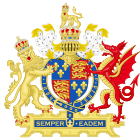Uniformity Act of 1559

|
|
| Long title | An Acte for the Uniformitie of Common Prayoure and Dyvyne Service in the Churche, and the Administration of the Sacramentes. |
|---|---|
| Citation | 1 Eliz 1 c 2 |
|
Status: Repealed
|
|
The Act of Uniformity 1558 (1 Eliz 1 c 2) was an Act of the Parliament of England. It was actually passed in 1559. It set the order of prayer to be used in the English Book of Common Prayer. All persons had to go to church once a week or be fined 12 pence (equivalent to just over £11 in 2007 ), a considerable sum for the poor.
After passage, fourteen bishops were dismissed from their sees, leaving all but one see, Llandaff, vacant. A new Archbishop of Canterbury, Matthew Parker, was appointed, and the question arose of how he could be consecrated while preserving the apostolic succession. The bishop of Llandaff, Anthony Kitchin, refused to officiate at Parker's consecration; thus instead bishops deposed and exiled by Mary I assisted: William Barlow, former Bishop of Bath and Wells, John Scory, former Bishop of Chichester, Miles Coverdale, former Bishop of Exeter, and John Hodgkins, former Bishop of Bedford. Barlow and Hodgkins had been consecrated in 1536 and 1537 using the Pontifical, the Latin Rite. Barlow was chief consecrator of Parker. The other two had been consecrated using the First Book of Common Prayer. The solution would give rise many years later to the Nag's Head Fable.
The Act was part of the Elizabethan Religious Settlement in England instituted by Elizabeth I, who wanted to unify the Anglican Church. Other Acts concerned with this settlement were the Act of Supremacy 1559 and the Thirty-Nine Articles (1563). Elizabeth was trying to achieve a settlement after thirty years of turmoil during the reigns of Henry VIII, Edward VI and Mary I, during which England had swung from Catholicism to Protestantism and back to Catholicism. The outcome of the Elizabethan Settlement was a sometimes tense and often fragile union of High Church and Low Church elements within the Church of England and Anglicanism worldwide.
...
Wikipedia
